
Health ecosystem players in China are starting to adopt generative AI models by DeepSeek, a new competitor to OpenAI.
Recently, NASDAQ-listed e-commerce platform Akso Health Group, which is expanding to medical technology, announced the integration of DeepSeek's models to upgrade its AI-driven diagnostic and medical assistant systems.
Hong Kong-listed healthcare SaaS provider ClouDr from Hangzhou has also integrated the DeepSeek R1 large language model into its hospital and pharmacy platforms.
Shenzhen University's South China Hospital is also using DeepSeek to optimise care, according to a local news report.
Meanwhile, insurance technology company Waterdrop made a strategic integration of DeepSeek's LLMs to enable the development of smart insurance service solutions. It said in a statement it now has an AI that supports multiple modes of interaction, including voice and text, and an AI for insurance quality assurance that can deeply analyse complex conversations, user intent, and emotional tone.
THE LARGER CONTEXT
DeepSeek has gained global traction for its cost-effective, open-source genAI models that are said to rival OpenAI's ChatGPT.
Following its meteoric rise, Australia, South Korea, and Taiwan were quick to ban DeepSeek models from all government devices, citing national security concerns. Several organisations and states across the United States have followed suit; bipartisan legislation in the House of Representatives was also introduced to ban its use.